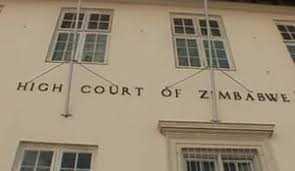
Zim Now Reporter
The Supreme Court of Zimbabwe has cleared Admire Rubaya, a top lawyer in Harare, of gold theft charges, ending a long legal battle.
The Supreme Court bench comprised of Justices George Chiweshe, Chinembiri Bhunu, and Hlekani Mwayera acquitted Rubaya who was initially initially charged alongside a Plumtree magistrate, prosecutor, and police officer in connection with a gold smuggling case involving his client, Jefat Chaganda.
Following Chaganda's acquittal on gold smuggling charges by Plumtree regional magistrate Timeon Makunde, which resulted in the court ordering the gold's return, the State initiated subsequent theft and obstruction of justice charges against Rubaya, the magistrate, prosecutor, and police officer.
This action was deemed by legal professionals to be an irregular procedural move.
"It is respectfully submitted that the prosecution of the appellant offends against the attorney-client privilege that obtains between the appellant and the second accused (Chaganda).
"Legal professional privilege is an established principle of our law that goes to the root of a fair trial as entrenched by section 69 of the Constitution," they argued.
Rubaya's lawyers then launched an application for exception which the High Court dismissed before they took the decision up for review by the Supreme Court.
The arguments forced the State into making concessions resulting in the Supreme Court accepting their argument and cleared him of wrongdoing.
The Supreme Court also acquitted the magistrate, Makunde.
In their argument before the Supreme Court, the lawyers pointed out that the High Court judge made concessions that the charge against Rubaya was defective but still allowed the matter to proceed which they described as a misdirection.
Related Stories
"There can be no doubt that the court a quo was not satisfied that a valid charge existed. It is that finding which appellant wanted it to make and to pronounce itself on its effect. By our law, an accused person cannot be expected to go through a trial where no valid charge exists. That is an irregularity," he argued.
Thabani Mpofu argued that the acquittal of Chaganda by the magistrate had nothing to do with his client and whether the decision was correct or not cannot be attributed to him.
He also argued that the decision by the magistrate is still standing which made it valid and had they had an issue, it would have been overturned.
"In the instant case what is revealed is that appellant (Rubaya) represented an accused person who was acquitted, and that the court acquitting the appellant’s client also ordered the release of the gold.
"Whether or not it was competent for the Learned Magistrate to make such an order is irrelevant, as the conduct of the Magistrate is not imputable to the appellant and no basis has been alleged for taking that position.
"The prosecution by some clumsy process, is trying to reason backwards in order to conclude that an offence or offences were committed. In other words, because the appellant made certain telephone calls or was seen with some of the accused persons after the acquittal of his client and after the Magistrate had ordered the release of gold then he must have connived to steal the gold or to defeat or obstruct the course of justice!
"With the greatest respect, the essential facts constituting the offence must be present at the time that the offence is committed, and cannot be inferred from conduct post the event giving rise to the charge," he argued.
It was also stated that whatever the State was doing did not disclose any offence of theft or obstruction of justice.
"If anything, what seems to be alleged is that merely because the person accused of smuggling gold was acquitted and the Magistrate ordered the release of
the gold, then everyone who interacted with the trial proceedings must be found to be guilty of the offences charged," he said.
Rubaya's lawyers further stated that the judge erred in not finding that there was no offence being disclosed by the charge.
"The court a quo erred in failing to find that the criminal prosecution is meant to be an impermissible review, through the criminal process, of completed magistrate’s court proceedings," they argued.
"The court a quo also erred in failing to decide the issue before it, namely, whether it was competent at law for the appellant to be required to account in criminal proceedings for a defence he had prosecuted on behalf of a client who still stood by the same defence and not renounced it.”



















Leave Comments